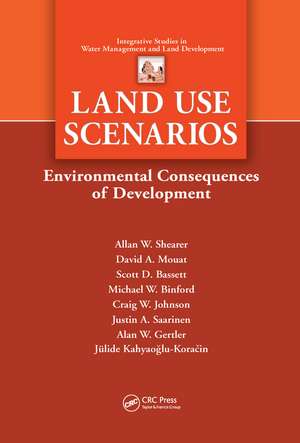Land Use Scenarios: Environmental Consequences of Development: Integrative Studies in Water Management & Land Development
Autor Alan W. Shearer, David A. Mouat, Scott D. Bassett, Michael W. Binford, Craig W. Johnson, Justin A. Saarinen, Alan W. Gertler, Julide Koracinen Limba Engleză Hardback – 14 ian 2009
Land Use Scenarios: Environmental Consequences of Development demonstrates how the success of local decision making is largely determined by factors that are difficult to control or forecast. It shows the importance of geographic vulnerability analysis, which takes into consideration possible scenarios about how, where, and when future patterns of land use might develop. It points to the consideration of critical uncertainties—those aspects of the future, that while difficult to predict, may have a profound impact on pending decisions.
Detailing research supported by the United States Marine Corps, the text presents a study of the region of Marine Corps Base Camp Pendleton and Air Station Miramar in California. While this area remains largely un-built, but extensively used, ongoing regional growth is having dramatic impact on the land and must be factored into any decision making. This research—
- Provides a better understanding of the potential consequences of urban development on native flora and fauna
- Describes theoretical concerns prompted by scenario-based projections
- Gives an overview of the history of scenario-based techniques for urban and regional planning
- Helps define measures for maintaining undeveloped lands in rapidly developing areas
Preț: 1156.60 lei
Preț vechi: 1535.15 lei
-25% Nou
Puncte Express: 1735
Preț estimativ în valută:
221.32€ • 231.66$ • 184.20£
221.32€ • 231.66$ • 184.20£
Comandă specială
Livrare economică 11-25 martie
Doresc să fiu notificat când acest titlu va fi disponibil:
Se trimite...
Preluare comenzi: 021 569.72.76
Specificații
ISBN-13: 9781420092547
ISBN-10: 1420092545
Pagini: 422
Ilustrații: 292 black & white illustrations, 15 colour illustrations, 45 black & white tables
Dimensiuni: 178 x 254 x 25 mm
Greutate: 2.15 kg
Ediția:1
Editura: CRC Press
Colecția CRC Press
Seria Integrative Studies in Water Management & Land Development
ISBN-10: 1420092545
Pagini: 422
Ilustrații: 292 black & white illustrations, 15 colour illustrations, 45 black & white tables
Dimensiuni: 178 x 254 x 25 mm
Greutate: 2.15 kg
Ediția:1
Editura: CRC Press
Colecția CRC Press
Seria Integrative Studies in Water Management & Land Development
Public țintă
ProfessionalCuprins
The Uncertainties of Regional Development and Their Possible Effects on Natural Resources Conservation. Approaching Scenario-Based Studies: Perceptions about the Future and Considerations for Landscape Planning. Scenario-Based Studies: Military Installations and Their Regions. The Regional Context of MCB Camp Pendleton and MCAD Miramar. Mapping Existing Conditions of the Region. Critical Uncertainties which Could Influence Development in the Region. Four Scenarios and Alternative Futures of the Regional Change. Hydrologic Consequences of the Alternative Futures. Biologic Consequences of the Alternative Futures. Discussion and Conclusions.
Notă biografică
Alan W. Shearer, David A. Mouat, Scott D. Bassett, Michael W. Binford, Craig W. Johnson, Justin Saarinen, Alan W. Gertler, Julide Koracin
Descriere
Detailing research supported by the U.S. Marine Corps, this text presents a study of an undeveloped area being impacted by overall regional development. Through this example, the authors explain geographic vulnerability analysis, which takes into consideration possible scenarios about how and when future patterns of land use might develop. It points to consideration of critical uncertainties, those difficult-to-predict aspects of the future, that must be factored into decisions. This work will aid managers and stakeholders to engage spatial contingencies toward the goal of developing more resilient landscapes that can support a primary mission as well as the conservation of natural resources.








